Business Video Surveillance Systems
When you own a business, no matter how small or large it may be, you should be investing in a surveillance system. Your mind will only be fully at ease when you know your business is secure. Every business owner should utilize numerous available technologies to protect their business. Since your company has valuable assets like data, electronics, etc., it is best to buy a video surveillance system to dissuade burglars and thieves; helping to protect your assets, employees, and property.
Businesses are advised to place their video surveillance cameras both outside and inside their business premises. The outside cameras will warn burglars that the facility is under surveillance and will help protect against break-ins. The inside cameras will serve to dissuade any employees from stealing from the business or breaking the rules.
Some businesses just set up outside video surveillance cameras and call it a day, but potential break-ins or burglary is not the only thing companies should worry over. Employees, management, and even customers can steal from you or damage your property without you noticing. A video surveillance system could be the difference between the success and failure of your business.
What Is A Video Surveillance System?
A system of cameras, recorders, and display units can make up a video surveillance system. The surveillance cameras can either be digital or analog and can come with many design features such as multiple direction cameras, discreet cameras, cameras that can record quality images in poor lighting, etc.
Video surveillance systems can (and should) be set up both outside and inside an establishment. They can be designed to only record when they sense movement, operate non-stop throughout the day, or be set to record at a particular hour/time of day. These cameras provide footage stored by either a digital video recorder or a network video recorder, viewed live by a security guard, or monitored from afar by a security company. Since video surveillance systems are closed (unauthorized persons can’t intercept and watch the contents since the signals are not broadcast), only authorized people can access the footage recorded.
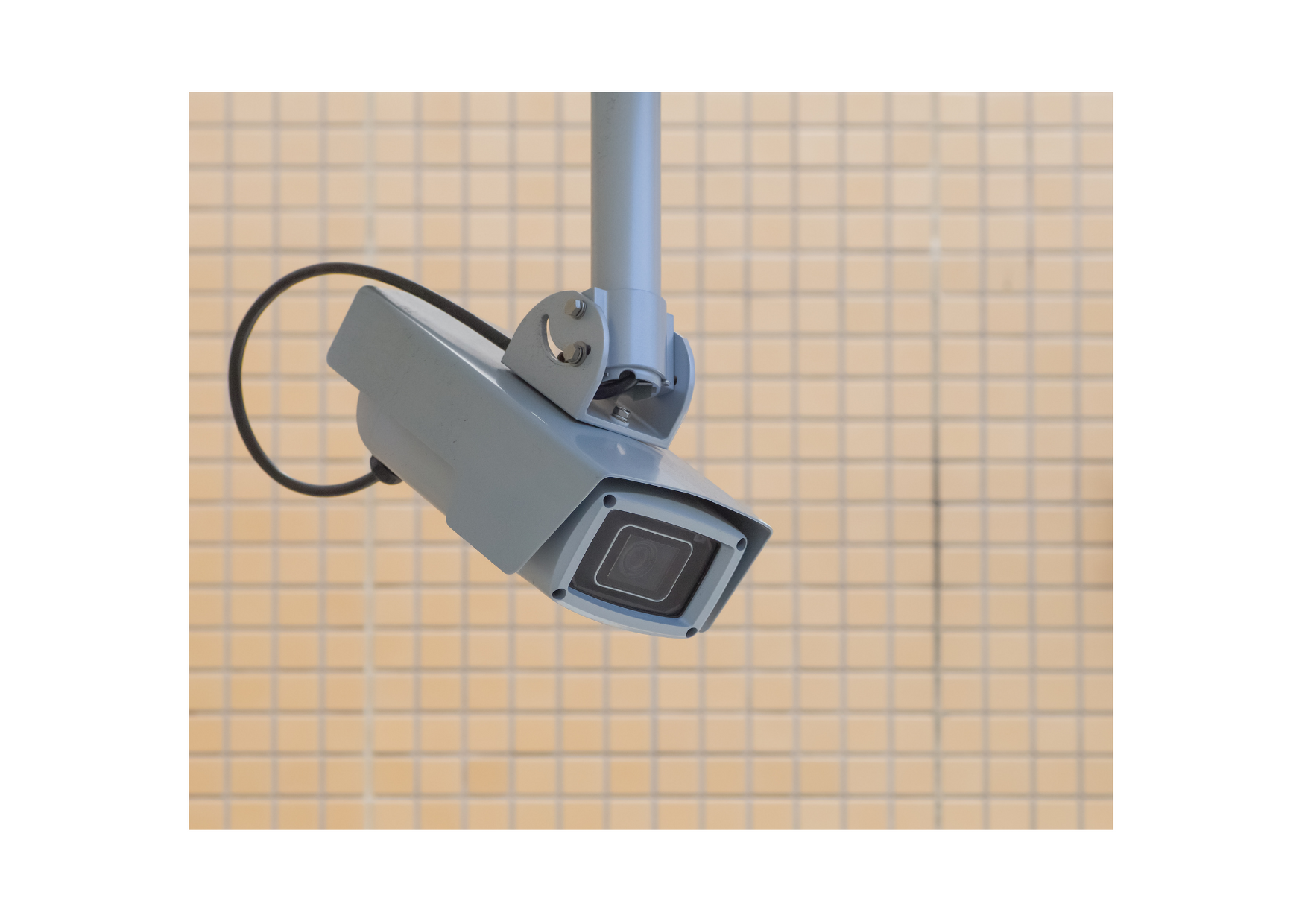
Best Video Surveillance Systems For Businesses
There are so many video surveillance systems in the market today, but these are our favorite systems for protecting businesses.
 Axis Communications
Axis Communications
Axis Communications is a key industry driver and has been the one to introduce the market’s first PTZ camera, first network camera, first thermal network camera, and HDTV network camera. Axis Communications strongly believes in research investment and development. The company offers various IP-based products and solutions for security and video surveillance.
Axis Communications is one of the best in the business. They don’t just provide DIY installation and high-definition cameras; they also have options for having professionals monitor all of its systems. This means that you will have an extra pair of eyes scanning your business, whether you’re watching your connected device or not.
Axis Communications can also provide security options that your business might need. These options include smart locks, security cameras, carbon monoxide detectors, video encoders, keypads, smart light controls, access control products, motion sensors, and more.
Most Axis Communications surveillance cameras have two-way audio, motion detection, field view, night vision, wired power, 1080p video quality, DIY option, etc. The system works by sending out alerts to any connected device once it detects anything out of the ordinary. All you have to do is check whether there is a legitimate security threat by using their mobile app to view your business remotely. You can notify the authorities yourself if you notice something is wrong. On top of everything, they also provide a 5-year warranty for their products.
One of their latest products is the Axis Q87 Bispectral PTZ Network Camera Series, which you can use for visual and thermal surveillance. Axis Communications’ advanced technologies have set them apart as the global leaders in network video.
 Hanwha
Hanwha
Hanwha is a surveillance and optoelectronics company; it is a large business that offers security solutions that encompass surveillance systems, optical instruments, network and analog cameras, modules, video management software, and recording solutions. Most of their surveillance cameras have these features:
- Motion Detection/Alert – Customizable motion detection; you can choose where movement will be detected.
- Two-Way audio that allows you to talk to visitors through a mobile app.
- Compatible with Amazon’s Alexa to arm and disarm your system and view motion clips/live streams.
- Easy to set up; you won’t need any wiring, tools, or professional installation.
- Free cloud storage, a temperature sensor, and live-view video.
- Weather-resistant, offering day and night coverage.
- With infrared HD night vision, you can record and view the videos, both day and night.
 FLIR
FLIR
FLIR Systems is the leading commercial company specializing in the design and production of thermal imaging cameras, their components, and their imaging sensors. They are used for night vision and heat detection because they measure higher temperatures than ordinary cameras. These are the features that FLIR surveillance cameras can have:
- 4K HD picture that offers a high night vision range: 135 feet
- Weatherproof
- Color/infrared Night Vision
- A thermal resolution of 160×120, quadrupling the number of pixels it can capture.
 Hikvision
Hikvision
Shortened to Hikvision, the Hangzhou Hikvision Digital Technology Company is a big player in the supply of video surveillance equipment. The company has a complete, multi-level R&D system that encompasses research, design and development, testing and technical support, and customer service. Its core technologies include video image processing, audio, video encoding, cloud computing, and artificial intelligence.
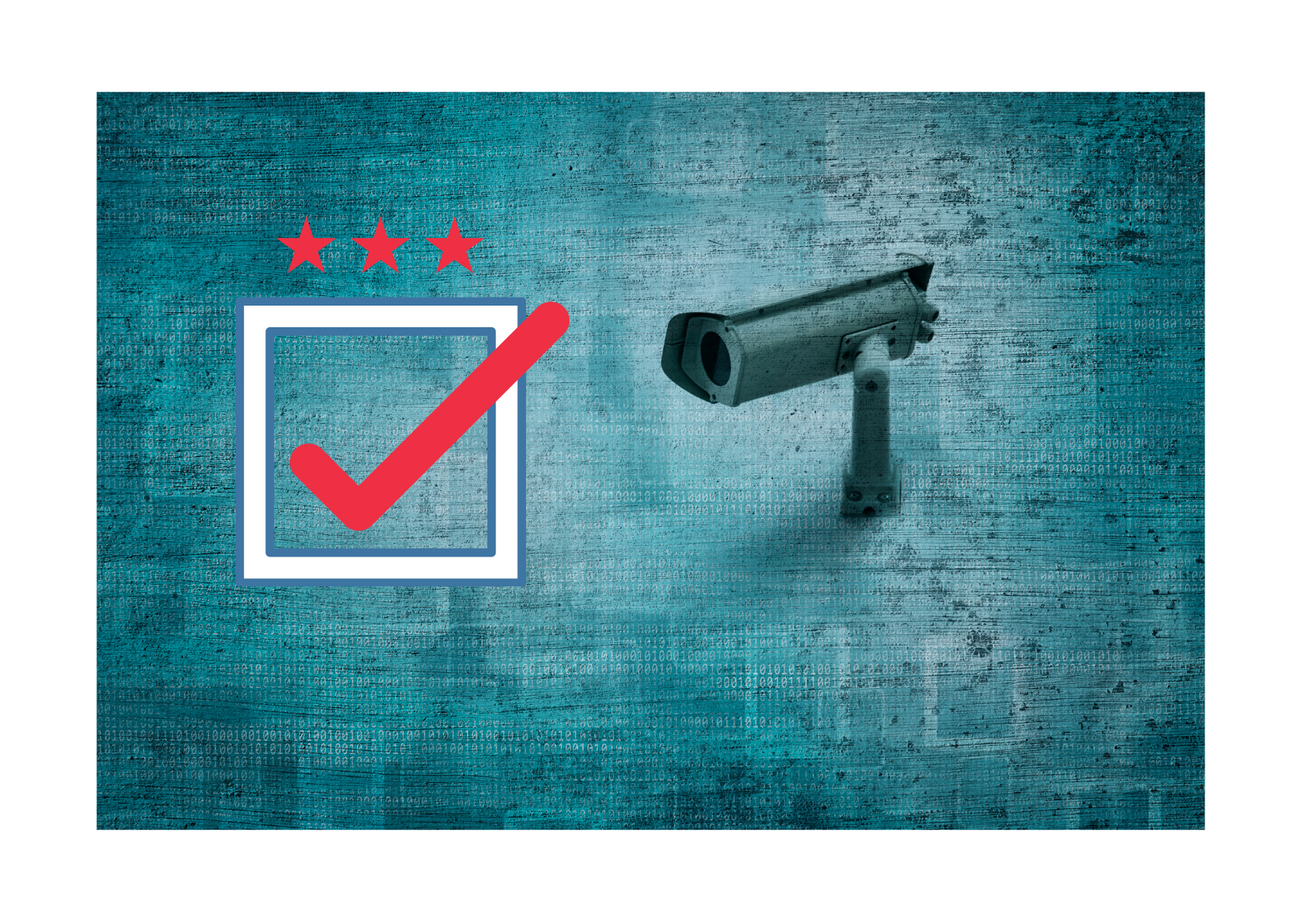
What to Consider Before Purchasing a Video Surveillance System
Before you purchase a video surveillance system for your business, you should consider the following things.
- The number of cameras you will need
- Whether you will use the cameras indoors or outdoors
- Whether you want wired or wireless surveillance cameras
- The camera quality you want
- Type of video storage you need
- Integration and cross-system compatibility between your security system and other devices
- Monitoring
- Night vision
Number Of Cameras
Your Subtitle Goes Here
On your own or with the help of a security consultant, you can figure out how many cameras you will need in your business premises once you know the areas you want to be covered. While accessing the number of cameras you will need, you have to keep in mind the type of camera you want, as some cameras (like analog) have a smaller range of vision, thus needing more cameras to cover the area.
Indoor Vs. Outdoor
Your Subtitle Goes Here
When considering the type of video surveillance system to purchase, make sure to choose outdoor cameras that are weatherproof and come with other features like motion sensors and night vision. Choose indoor cameras compatible with your other devices in the facility, like alarm systems, etc. You can choose not to buy an indoor camera that is weatherproof.
Wired Vs. Wireless Surveillance Cameras
Your Subtitle Goes Here
Wireless surveillance cameras use individual wireless sensors located in your facility. They make use of radio frequency signals to communicate wirelessly with the control panel. Both of these types of cameras have their advantages and disadvantages. If you don’t want the hassle of wiring and constant battery change, choose wireless surveillance cameras.
Camera Quality
Your Subtitle Goes Here
You will find that most new business surveillance cameras offer 1080p video quality for easily streamed video. You should choose high-resolution cameras, as it improves the integrity of the videos and images.
Video Storage
Your Subtitle Goes Here
Many surveillance cameras offer video storage, like local storage on SD cards or a cloud storage option. Factors like the amount of footage, resolution of footage, and how long you want the video stored can dictate the amount of storage you have when monitoring. Some security companies even offer plans that can range in size, from a few gigabytes to over-storage calculators online.
Cross-System Compatibility & Integration
Your Subtitle Goes Here
Make sure your security system is compatible with your facility or wireless equipment. Also, make sure that the camera you buy is compatible with your recording system, whether it be a Digital Video Recorder (for analog cameras) or a Network Video Recorder (for IP cameras).
Monitoring
Your Subtitle Goes Here
The monitoring feature is one of the basic features you should look for in your surveillance camera. You can either have a place in your business where a security guard can watch the monitors, an app to monitor your business from your smartphone, or a security company that remotely monitors your cameras. Make sure you buy high-resolution cameras that will make monitoring easier for you.
Night Vision
Your Subtitle Goes Here
This option is helpful if you are interested in 24/7 monitoring. When choosing cameras, you should look for one with a high range of vision that has infrared night vision. You can use the cameras to view the outside of your business at night. Most times, animals trigger alerts, so you can use this feature to check whether the signals were caused by human burglars or by animals.
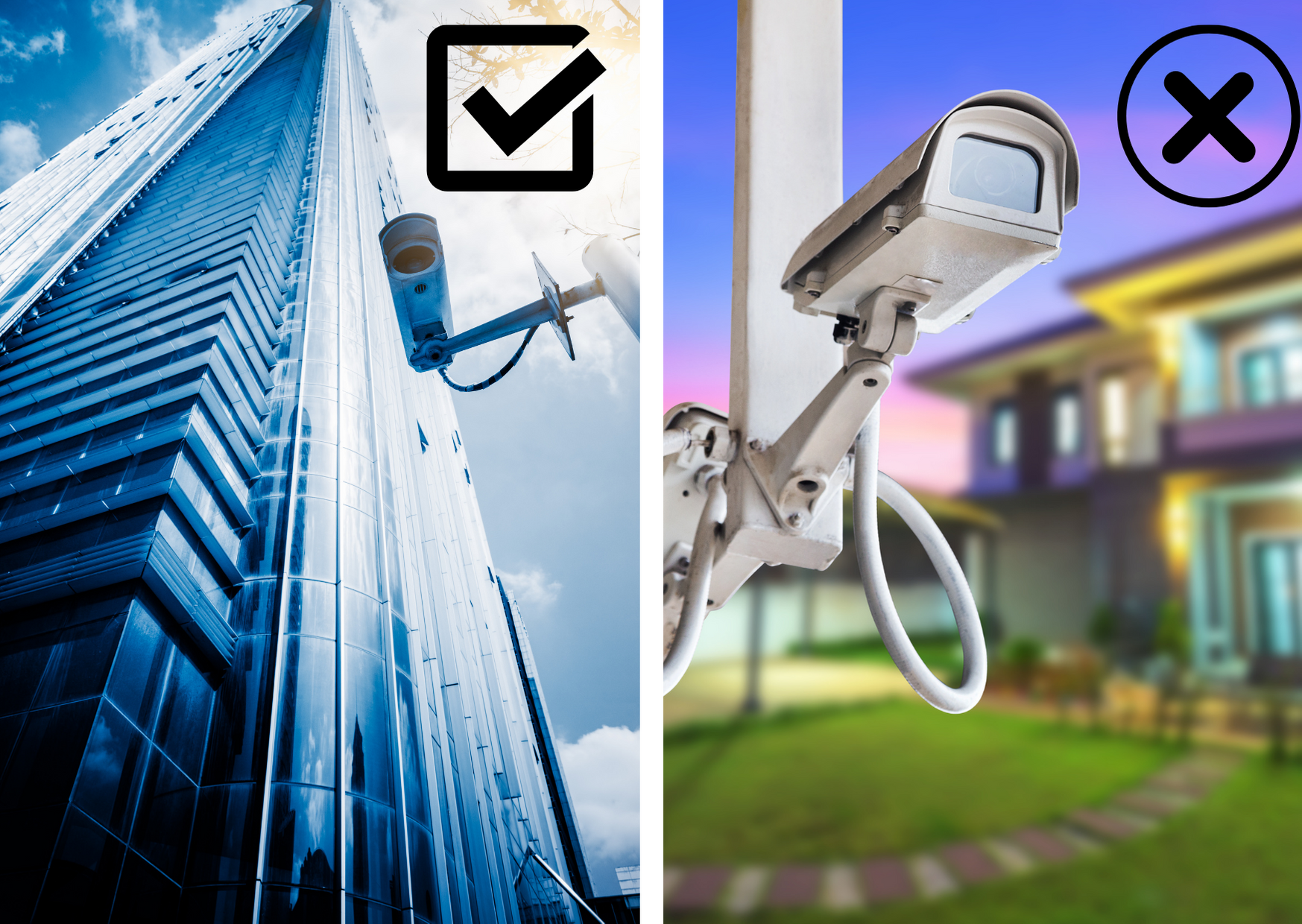
Benefits Of Video Surveillance For Businesses
Using video surveillance for your business has many benefits such as monitoring productivity, reducing liability, safety improvement, inventory monitoring, crime deterring, reduction of shrinkage, real-time monitoring, etc.
Monitor Productivity
Your Subtitle Goes Here
The presence of video surveillance in your business premises will help monitor employee productivity. It will let you know which employees are slacking and which ones aren’t.
Reduce Liability
Your Subtitle Goes Here
If something happens in your business premises, you are sure to know the person/person responsible for it.
Improve Safety
Your Subtitle Goes Here
Video surveillance helps in improving the overall safety of your business establishment. They help prevent break-ins, employee theft, and other criminal activities. The presence of a camera gives a sense of security to customers and employees alike.
Monitor Inventory
Your Subtitle Goes Here
Video surveillance will help monitor your inventory supply levels and how your employees are interacting with the stock. It lets you know when you need to replace a particular product.
Deter Crime
Your Subtitle Goes Here
Video surveillance acts as a crime deterrent. It lets criminals know that your business is protected and that they would likely be caught if they attempt illegal activities.
Reduce Shrinkage
Your Subtitle Goes Here
It will help reduce product loss from both employees and visitors.
Real-Time Monitoring
Your Subtitle Goes Here
You can monitor what is happening on the premises as it is happening, which means you can immediately attend real-time incidents.
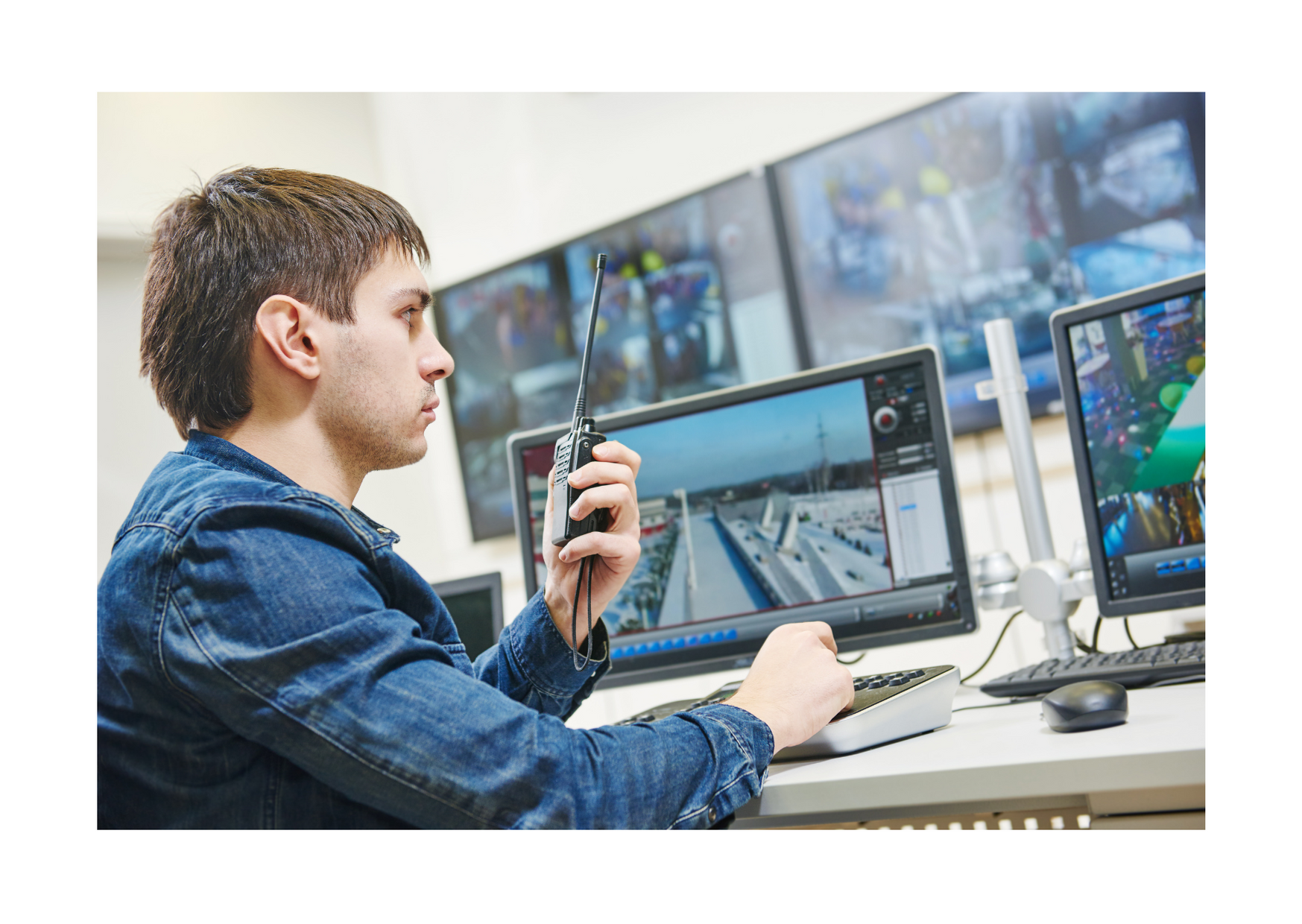
Business Solutions Vs. Residential Solutions
Business security system solutions and residential security system solutions have two significant differences:
- Security systems used in businesses are more complex. Companies are usually located in high traffic areas and, depending on the services they render, are more attractive to criminals. Alarm systems for business premises typically have security levels instead of residential areas that have watch programs or/and security guards. Most businesses use access cards to help track visitors, but most residential areas don’t use access cards.
- The potential risks of both solutions are different. Depending on the type of business, most offices require security systems that prevent break-ins, chemical spills, fire, natural disasters, terrorist attacks, product tampering, etc. While the most significant potential threats that most residential areas face are break-ins, fires, and natural disasters.
The above shows that commercial video surveillance systems are superior to residential video surveillance systems. Investing in a commercial video surveillance system for your business is the best choice.
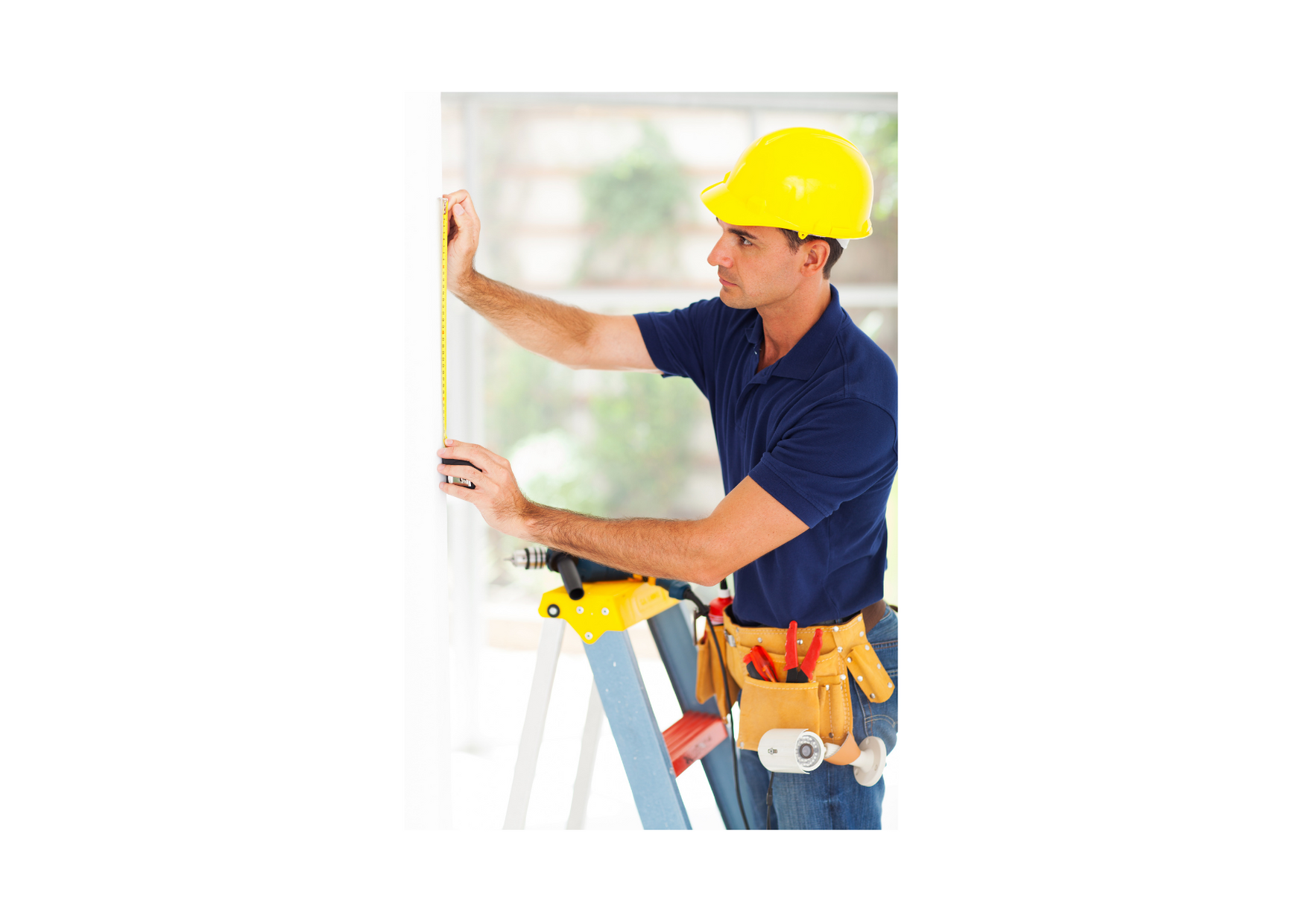
Professional Video Surveillance Layout & Design
With advances in technology, surveillance professionals no longer need to set up a complex surveillance system since installing a single or multi-camera surveillance system is a lot easier. When designing the video surveillance layout, you have to consider your camera type, camera placement and installation, legal issues, and system variance.
Camera Types
Most surveillance systems use either fixed cameras or PTZ (pan-tilt-zoom) cameras. Fixed cameras are cheaper and have a higher resolution image. PTZ cameras are capable of zoom and remote directional control. PTZ cameras don’t cover as many areas and should be placed in open layouts. They are great for zooming in on transactions, monitoring guests, and any suspicious activity.
Many specialty cameras in today’s market are capable of meeting the specific needs of almost any situation. These cameras include fisheye lenses, 360-degree and panoramic cameras, explosive and waterproof cameras, thermal imaging, night vision, etc. To properly design your surveillance system’s layout, you have to know the type of camera you need and its pros and cons.
Camera Placement & Installation
Where to set up your cameras is an essential factor of any surveillance system. Ensure your cameras are installed in places that cover many areas with little or no overlap. Check out our security camera installation guide for more detailed information.
Get a FREE Consultation!
Fill out this form and an Umbrella Security Systems security expert will contact you to discuss and guide you to choose the best video surveillance solutions for your business.

 Axis Communications
Axis Communications Hanwha
Hanwha FLIR
FLIR Hikvision
Hikvision